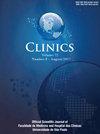Safety of human serum albumin infusion in heart failure patients with hypoproteinemia: a propensity score-matched analysis
IF 2.4
4区 医学
Q2 MEDICINE, GENERAL & INTERNAL
引用次数: 0
Abstract
Objectives
Heart failure, especially in the elderly, is a growing global issue. This research explores the safety of human albumin infusion in treating heart failure patients with hypoalbuminemia, despite limited clinical data on its use with diuretic therapy.
Methods
Data were collected from the Medical Information Mart for Intensive Care III (MIMIC-III) database, which included a cohort of 6094 patients diagnosed with heart failure. Propensity score matching, logistic regression, Kaplan-Meier curves, and Locally Weighted Scatterplot Smoothing (LOWESS) curves were used to examine how albumin administration correlates with different clinical results. The evaluated results comprised in-hospital mortality, cumulative fluid output over 24 hours, Length of Stay in the Intensive Care Unit (ICU LOS), and overall hospitalization duration (hospital LOS).
Results
Infusing albumin was found to be markedly linked with higher in-hospital mortality among heart failure patients whose serum albumin levels were ≤ 2.9 g/dL (p < 0.001). However, no statistically significant correlation was found between the patients with levels > 2.9 g/dL (p = 0.62). Following propensity score matching in the ≤ 2.9 g/dL serum albumin group, albumin infusion was linked to prolonged hospital and ICU stays (p = 0.002, p < 0.001), but showed no significant association with total 24 hour fluid output and 90-day survival (p = 0.173, p = 0.656).
Conclusion
The use of albumin has been linked to increased risk-adjusted mortality during hospitalization, as well as prolonged stays in both hospital and ICU settings for patients with heart failure and low levels of serum albumin. Physicians should exercise caution when considering the administration of albumin in these cases.
人血清白蛋白输注对心力衰竭伴低蛋白血症患者的安全性:倾向评分匹配分析
心衰,尤其是老年人心衰,是一个日益严重的全球性问题。本研究探讨了人白蛋白输注治疗心力衰竭伴低白蛋白血症患者的安全性,尽管其与利尿剂治疗的临床数据有限。方法从重症监护医学信息市场III (MIMIC-III)数据库中收集数据,其中包括6094例诊断为心力衰竭的患者。使用倾向评分匹配、逻辑回归、Kaplan-Meier曲线和局部加权散点图平滑(LOWESS)曲线来检查白蛋白给药与不同临床结果的相关性。评估结果包括住院死亡率、24小时内的累计液体输出、在重症监护病房(ICU LOS)的住院时间和总住院时间(医院LOS)。结果在血清白蛋白水平≤2.9 g/dL的心力衰竭患者中,输注白蛋白与较高的住院死亡率显著相关(p <;0.001)。然而,患者的水平>;2.9 g/dL (p = 0.62)根据倾向评分匹配≤2.9 g/dL血清白蛋白组,白蛋白输注与延长住院时间和ICU住院时间相关(p = 0.002, p <;0.001),但与总24小时排液量和90天生存率无显著相关性(p = 0.173, p = 0.656)。结论:白蛋白的使用与住院期间风险调整死亡率的增加,以及心力衰竭和血清白蛋白水平低的患者在医院和ICU环境中的住院时间延长有关。在这些病例中,医生在考虑给药白蛋白时应谨慎。
本文章由计算机程序翻译,如有差异,请以英文原文为准。
求助全文
约1分钟内获得全文
求助全文
来源期刊

Clinics
医学-医学:内科
CiteScore
4.10
自引率
3.70%
发文量
129
审稿时长
52 days
期刊介绍:
CLINICS is an electronic journal that publishes peer-reviewed articles in continuous flow, of interest to clinicians and researchers in the medical sciences. CLINICS complies with the policies of funding agencies which request or require deposition of the published articles that they fund into publicly available databases. CLINICS supports the position of the International Committee of Medical Journal Editors (ICMJE) on trial registration.
 求助内容:
求助内容: 应助结果提醒方式:
应助结果提醒方式:


